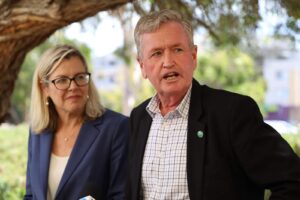The Opposition has slammed the Cook Labor Government for its failure to address multiple biosecurity threats to Western Australia, accusing Labor MPs of not even showing up to debate the issue in Parliament this week.
Opposition Leader Shane Love said WA is facing critical biosecurity challenges, yet the State Government has show little urgency or action.
“From the shot-hole borer outbreak, which is ravaging our metropolitan tree canopy and threatening southern forests, to the tomato brown rugose fruit virus, which could devastate our horticultural industry, WA is on the front line of biosecurity risks,” Mr Love said.
“Adding to this is the surge in illegal fishing vessels in our norther waters, posing a threat not only to our fishing industry but also to our biosecurity, especially as neighboring regions like Indonesia grapple with outbreaks of lumpy skin and foot-and-mouth disease.”
Mr Love criticised the Government for failing to engage with these pressing issues despite repeated calls from the Opposition and growing concern from farmers, horticulturalists, regional communities and local governments.
“It was incredibly disheartening to see the Government’s indifference during a Matter of Public Importance moved by the Opposition this week,” Mr Love said.
“Labor MPs barely bothered to attend, with the Speaker having to call for quorum twice within 30- minutes due to the low numbers of MPs present in the Parliament.
“This shows a total disdain for the Parliament and for those communities and industries which are being threatened by this Government’s lackadaisical approach to biosecurity management.”
Deputy Opposition Leader Peter Rundle MLA accused the Government of having its head in the sand when it came to biosecurity.
“In Perth alone, 3,000 trees have been destroyed due to the polyphagous shot-hole borer
outbreak, and with spring providing ideal conditions for the pest, the risk of further spread is immense,” Mr Rundle said.
“The tomato brown rugose fruit virus, which has the potential to reduce yields of tomatoes, capsicums and chillies by 75 per cent, is another major threat.
“While New Zealand acted swiftly by suspending tomato imports from Australia in August, it took WA three more weeks to impose import restrictions from South Australia, only doing so on September 12.
“WA’s slow response is unacceptable, and it’s our growers and regional communities who will pay the cost for the Cook Labor Government’s complacency.”


